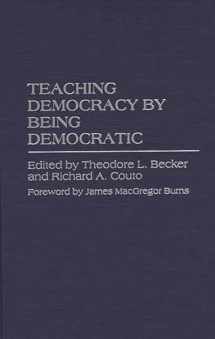
Teaching Democracy by Being Democratic (Praeger Series in Transformational Politics and Political Science)
ISBN-13:
9780275955526
ISBN-10:
0275955524
Edition:
Illustrated
Author:
Ted Becker, Richard A. Couto
Publication date:
1996
Publisher:
Praeger
Format:
Hardcover
200 pages
FREE US shipping
Book details
ISBN-13:
9780275955526
ISBN-10:
0275955524
Edition:
Illustrated
Author:
Ted Becker, Richard A. Couto
Publication date:
1996
Publisher:
Praeger
Format:
Hardcover
200 pages
Summary
Teaching Democracy by Being Democratic (Praeger Series in Transformational Politics and Political Science) (ISBN-13: 9780275955526 and ISBN-10: 0275955524), written by authors
Ted Becker, Richard A. Couto, was published by Praeger in 1996.
With an overall rating of 3.8 stars, it's a notable title among other
books. You can easily purchase or rent Teaching Democracy by Being Democratic (Praeger Series in Transformational Politics and Political Science) (Hardcover) from BooksRun,
along with many other new and used
books
and textbooks.
And, if you're looking to sell your copy, our current buyback offer is $0.38.
Description
The best way to teach democracy has been the subject of an ongoing debate for 2,500 years. Unlike most books about teaching democracy, this one spends more time on how to teach democracy than the what and why of teaching democracy. It punctures the irony of teaching democracy by lectures and superior teachers. In its place, this book provides a variety of illustrations for the teaching of democracy in an experiential and egalitarian fashion. The introduction presents a theoretical and analytical framework of democracy and democratic pedagogy. The six chapters cover topics such as structuring a democratic classroom; democratic practices that empower students; problem solving and community service that make the classroom a laboratory for democracy; and university-based programs of democratic alternatives that serve the community. The volume's treatment of community organization, students as collaborators, personal empowerment, the community of need and response, and the democratic organization expresses its preference for direct democratic participation.


We would LOVE it if you could help us and other readers by reviewing the book
Book review

Congratulations! We have received your book review.
{user}
{createdAt}
by {truncated_author}


